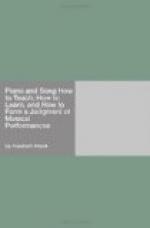My daughters play the music of all the principal composers, and also the best salon music. Limited views of any kind are injurious to art. It is as great a mistake to play only Beethoven’s music as to play none of it, or to play either classical or salon music solely. If a teacher confines himself to the study of the first, a good technique, a tolerably sound style of playing, intelligence, and knowledge are generally sufficient to produce an interpretation in most respects satisfactory. The music usually compensates for a style which may be, according to circumstances, either dry, cold, too monotonous or too strongly shaded, and even for an indifferent or careless touch. Interest in the composition frequently diverts the attention of even the best player from a thoroughly correct and delicate mode of execution, and from the effort to enhance the beauty of the composition, and to increase its appreciation with the hearer. In the performance of classical music, inspiration—that is, the revelation of an artistic nature and not empty affectation—can be expected only from an artist, and not from a pupil. Therefore, with more advanced pupils, I take up in my lessons, in connection with a sonata by Beethoven, a nocturne or waltz by Chopin, and a piece by St. Heller or Schulhoff, Henselt, C. Meyer, &c. Elegance and polish, a certain coquetry, nicety, delicacy, and fine shading cannot be perfected in the study of a sonata by Beethoven; for which, however, the latter pieces present much greater opportunities. Besides this, variety is much more sustaining to the learner; it excites his interest; he does not so soon become weary, and is guarded from carelessness; his artistic knowledge is increased, and he is agreeably surprised to find himself able to perform three pieces so distinct in character.
* * * * *
“Expression cannot be taught, it must come of itself.” But when are we to look for it? When the stiff fingers are fifty or sixty years old, and the expression is imprisoned in them, so that nothing is ever to be heard of it? This is a wide-spread delusion. Let us look at a few of those to whom expression has come of itself. X. plays skilfully and correctly, but his expression continues crude, cold, monotonous; he shows too pedantic a solicitude about mechanical execution and strict time; he never ventures on a pp., uses too little shading in piano, and plays the forte too heavily, and without regard to the instrument; his crescendi and diminuendi are inappropriate, often coarse and brought in at unsuitable places; and—his ritardandi! they are tedious indeed! “But Miss Z. plays differently and more finely.” Truly, she plays differently; but is it more finely? Do you like this gentle violet blue, this sickly paleness, these rouged falsehoods, at the expense of all integrity of character? this sweet, embellished, languishing style, this rubato




